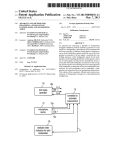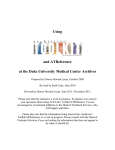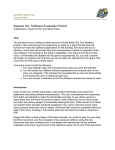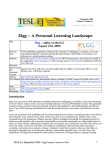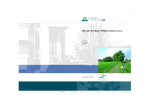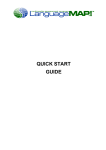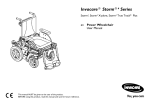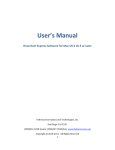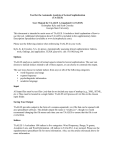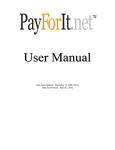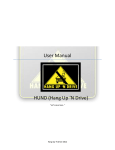Download app - Lesson Planet
Transcript
iOS7 iPad Basics © Lesson Planet 2014 www.LessonPlanet.com Introduction This iPad basics guide is the place to be- In order to make the most of this training, gin if you are new to the iPad, you are look- it is recommended that you use a laptop or ing to fill in the gaps in your learning, or desktop computer to view this guide along- you wish to teach others about using the side your iPad so that you can practice iPad. while following the course. We will also The guide covers just the essentials for getting started. If you feel you are beyond the cover how to connect your iPad to Wi-Fi in this course. basics, skip ahead to one of our more ad- The best way to learn is to practice, so be vanced iPad courses; they build on the fun- sure to take time to set up your iPad and damentals presented in this course. try out each feature. Read on for a step- The information is organized into short segments to help you focus on one topic at a time. Feel free to skip around and work at by-step guide that will help you build a practical foundation for using an iPad for your needs as an educator. your own pace to learn exactly what you want to learn. Be sure to take a look at the accompanying videos and additional materials, which include notes, ideas, and handouts. Also check out the appendices at the end of this eBook. © Lesson Planet 2014 www.LessonPlanet.com i 1 What comes with your iPad and what does an iPad do, exactly? Out of the Box You just got your iPad. Now what? Maybe it’s in the box, or was handed to you unboxed and you aren’t sure where to begin. If you have received an iPad that is already out of the box, you can continue to read here, or skip ahead to “The Outside of the iPad” section. © Lesson Planet 2014 What Does an iPad Come With? The iPad comes with one cable and a power adapter shaped like a cube or brick. Depending on the model of the iPad you have, your iPad will come with either a www.LessonPlanet.com 2 lightning or a 30-pin connector. The lightning connector is a smaller and more durable connector, but both get the job done. The cable has multiple uses. Plug the cable into the power adapter and the adapter into the wall to charge your device. The connector also works as a data cable, which you can plug into a USB port for charging and data transmission purposes. The iPad is designed to be connected to the Internet, which makes immediately accessing websites and other online resources simple. The iPad, of course, will also be in the box, along with a little bit of documentation. Be advised that the documentation is not a user manual, and the iPad does not come with headphones or a cover. What Does an iPad Do? There has been talk in the news and at schools about the shift toward iPad usage in the classroom. That presents us with important questions, the most important being, what can the iPad do? An iPad can be used anywhere in your classroom, school, or almost anywhere you choose. In other words, it is mobile and can be easily used while walking around the classroom and moving between groups of students. It can also be transferred between students for individual work. The iPad is designed to be connected to the Internet, which makes immediately accessing websites and other online resources simple. Internet connection is vital to the iPad. Also note, iPads use apps, another great feature. The word app is short for application. Apps are small software programs, usually designed with a single purpose. For example, you might have an app just to take photos, one for managing © Lesson Planet 2014 www.LessonPlanet.com 3 your banking, one for creating flashcards, The next step is to take a look at the out- and so on. Think of each app as a small side of the iPad. Continue reading to ex- program. Apps often have handy, practical plore features and functions. features. For example, an app can help you record attendance and automatically e-mail a student’s family if he is not in class; you don’t even have to write a message. The iPad is uniquely designed to help with a series of other tasks. • First, the iPad helps you create. You can draw, type, take photos, make movies, compose music, record student information, combine images of realia with text, and much more. • Second, you can easily curate and/or organize information to make it easier to access and use. • Third, you can collaborate with the iPad. It is very easy to share work and thoughts with students, parents, and other educators. We will point back to the ability to create, curate, and collaborate throughout this course to help provide a broader vision for using the iPad to improve job efficiency and ultimately, student achievement. © Lesson Planet 2014 www.LessonPlanet.com 4 2 The Outside of the iPad The iPad is designed to be used primarily through the touchscreen; however, there are a few physical buttons to explore. The Sleep/Lock Button Place the iPad vertically before you, making sure to put the circular button at the bottom. Next, locate the Sleep/Lock button by running your finger along the top edge of the device. Press and hold this button to turn on your iPad. The Apple logo will appear when the iPad is turning on. Once the iPad is turned on, this same Sleep/Lock button can be used to save the iPad’s battery. Put your device into sleep mode by tapping the button once quickly. Notice that the screen goes black. The iPad is still on, but it is using very little energy. Tap this button again to wake your device, in order to continue using it. The last function of the Sleep/Lock button is to turn off the iPad. If you know you are finished using your iPad for an extended © Lesson Planet 2014 www.LessonPlanet.com 5 period of time, or if you simply wish to power if off, press and hold the Sleep/Lock button for about two seconds. On the screen a notification will appear that reads slide to power off. Use your finder to swipe from left to right. Side Switch The default setting for the side switch is mute, so you can quickly mute your device without having to use the volume button. However, you can change the settings on this button so that it locks rotation instead. This is done in the Settings app, which we The Home Button The Home button is the only button on the front of the iPad; it has a square icon and is in the middle of the short side of the iPad. This button has a number of different uses, some more obvious than others. First, pressing the Home button will wake your iPad if it is in sleep mode; a quick tap of the Wake/Sleep button will do the same. Second, if you press the Home button while you are using any app, it will return you to the home screen. will cover in the iPad Intermediate course. If lock rotation is already turned on, someone has gone into Settings and changed the setting on the switch. You may change it back, or not, it’s up to you. Rotation lock simply means that the iPad will stay in landscape or portrait mode, even when you turn it 90 or more degrees. Without rotation lock, your iPad screen will change to match the physical orientation of the device. Continue reading for instruction on basic gestures to when interacting with the iPad. Volume Control The button located on the side of the iPad controls the volume. Some models of the iPad have just one button, while others have two. Press the volume button closest to the top to increase volume, and the press the button or part of the button closest to the bottom to decrease the volume. © Lesson Planet 2014 www.LessonPlanet.com 6 3 Master the various finger gestures necessary for controlling your device. Basic Gestures The iPad’s surface is designed for controlling and interacting with the device. Part of learning how to use an iPad is learning and becoming accustomed to the various finger gestures used to control the device. © Lesson Planet 2014 Tapping The most basic gesture is a simple tap. Tap with the pad of your fingers to select an app or any button on the touch screen. Tap just once on an app to launch it. Press www.LessonPlanet.com 7 the Home button to return to the home 4. Take two fingers and turn them either clockwise or counter clockwise to ro- screen and access other apps. tate Swiping Another gesture to try is swiping. Lightly brush your finger across the screen in the direction you want something to move. You can close Maps and return to the Home screen in one of two ways. The first way is to press the Home button. The second option involves a more complicated Practice gesture. Spread out all five fingers and 1. Open the Settings app by tapping it pinch them together. once 2. Notice the area on the left side, labeled Settings 3. Take your finger and swipe from the These basic gestures will help you navigate the iPad like a pro. Continue reading to find out how to connect to the Internet. bottom to the top to reveal all the different options 4. Don’t worry if you aren’t sure what all the options do. The goal here is to see how to find additional options within the app. You might want to swipe up and down, or right and left Zooming and Rotating Try zooming in and out with the Maps app. This app is installed on every iPad and is a great place to practice. 1. Tap on the Maps app to open it 2. Place two fingers on the map and spread them apart to zoom in 3. Zoom out by doing the opposite. Start with your fingers apart and pinch them together © Lesson Planet 2014 www.LessonPlanet.com 8 4 Connecting to the Internet In order to use your iPad to its full potential, it is essential that you connect it to the Internet. There are two basic ways to connect: Get Connected 1. Open the Settings app by tapping it 2. Select Wi-Fi on the left side of the screen; notice that the menu on the right has changed 1. Wi-Fi 3. Find Wi-Fi and move the virtual slider 2. A cellular data plan from the left to the right, until it is Most people who use iPads for educational purposes use a wireless Internet con- green, this will turn on your Wi-Fi 4. The iPad will immediately begin search- nection (Wi-Fi). Some have the option to ing for an Internet connection and will connect using cellular data, which requires display all the available networks a monthly subscription (similar to a cell phone). A data plan is useful for those times when you and your iPad are out of range of a Wi-Fi network. 5. Tap once on the name of the network that belongs to your school or district 6. Enter the password provided to you by your school or district; if you don’t This guide focuses on using Wi-Fi, since many of you will be using that option. We highly recommend that you use the Wi-Fi network provided by your school or district since there are content filters and other protections in place to help you have a safer experience when you are online in know this information, check with your administrator or IT department 7. Notice that the name of the network is now listed directly under Wi-Fi and a blue check mark has appeared. You can check here to verify that you are connected to a network front of your students. © Lesson Planet 2014 www.LessonPlanet.com 9 Once you are finished, press the Home button or try out the Now that you are connected to a Wi-Fi network, you are read to use the iPad its fullest potential five-finger pinch to return to the home screen. Notice how the slice-of-pie-shaped icon near the word iPad in the upper-left side of the screen is filled with lines or bars. This is a second place to verify that you are connected to the Internet. If the pie slice is empty, you are not connected. Now that you are connected to a Wi-Fi network, you are ready to use the iPad to its fullest potential. You are also ready to use all the apps on your iPad, many of which require an Internet connection to work. And, remember, once you’ve added a network, your iPad will automatically reconnect when you are in range. You only need to follow these steps to add a new network, or if you notice that for some reason, you are not connected to the Internet. The iPad comes pre-loaded with a series of apps. Continue reading for an introduction to those apps. © Lesson Planet 2014 www.LessonPlanet.com 10 5 Apps That Come With the iPad Take a glance at the 20 apps that are on your iPad when it comes right out of the box. It’s time for a brief tour of the iPad’s basic Apps are small software programs, usually apps, which you can start using right designed with a single purpose, like brows- away! ing the Internet. There are some that do a lot more, but many have only one purpose. © Lesson Planet 2014 www.LessonPlanet.com 11 There are a plethora of apps that can be detail on how to set up your mail. The Mail downloaded; we will cover this in our iPad app is very useful, so be sure to read up Beyond the Basics course. Our goal here on it or watch one of our videos. is to highlight what comes with the iPad. Safari You will want to become familiar with Safari is the default web these apps because, not only are they browser for the iPad. The free, they are also much more powerful for the classroom than many people realize. The iPad comes with 20 apps right out of next chapter of this guide, Safari Web Browser Basics, covers Safari in more detail. the box. However, if your IT department has customized it to better meet your Music needs, your iPad might have more apps on The Music app allows you to it. Our purpose here is to give you a brief stream music for free. Be overview of each app. aware that there are ads. Apps on the Home Screen Apps in the Dock Your dock is located at the bottom of the FaceTime screen, and may look a little different than Face Time allows you to described here if it has been customized. make an audio or video call to a Mac, iPhone, or other iPad. Messages This app can be used to Calendar send text messages and pho- In this app, you can view the tos to cell phones and other calendar by either day, week, iPad users. It can help you stay connected with parents, students, and colleagues. month, or year. It also includes a set of useful features designed to make scheduling appointments and invit- Mail The Mail app is used to send, receive, compose, and read e-mail. Check out the ing others to events easier. The iPad Beyond the Basics course has further instructions for using the Calendar app. iPad Beyond the Basics course for more © Lesson Planet 2014 www.LessonPlanet.com 12 Photos Notes Go to this app to review any A very simple, yet helpful photos or videos you have word processing program. taken. Use Notes to type up lesson plans, notes, observations, and more. Camera Reminders Use this app to take still photos or to record video. The iPad Intermediate course offers some great tips on how to apply this app to the classroom. Set alarms that trigger according to your iPad’s location or at specific times. You can also include notes within Contacts each reminder. Super useful for busy teach- Store parent and colleague ers! information here. Photo Booth Clock Use this app to take images Tell the time, show various with artistic effects. Great for time zones, and use the student projects, Back-To- timer, which is quite effective School Night, and more. for classroom use. Game Center Maps The Game Center is used by Take a look at local land- some apps to track progress marks or send your students within games, including on a virtual field trip of an re- some learning games that connect players gion you are studying. The Maps app has with other players from around the world. with 3-D renderings of most large cities. Make sure you practice caution with this app, since it does connect to strangers. Videos Watch downloaded videos Newsstand using the Videos app. The Newsstand offers free and paid electronic magazines and periodicals. © Lesson Planet 2014 www.LessonPlanet.com 13 iTunes Store This is where you preview, download, and purchase music, TV shows, and audiobooks. App Store Use the App Store to download apps. There are thousands of apps available for education. Check out our iPad Beyond the Basics course for an in-depth explanation on how to download and purchase apps. Settings Use this app to customize and refine how the iPad functions. Think of it as the brain of the iPad. Each iPad course includes information on how to use the Settings app. There is so much that can be done with an iPad right out of the box. The next chapter will introduce you to the Safari web browser. © Lesson Planet 2014 www.LessonPlanet.com 14 6 Safari Web Browser Basics Visiting and viewing webpages is easy with 6. Type in a specific website, such as lessonplanet.com to view the site im- the Safari app. You must have your iPad connected to the mediately Internet in order to use Safari. For more in- Other Features formation about connecting to a Wi-Fi net- Tap the back and forward arrows, located work with your iPad, see chapter four. in the upper-left corner, to move between webpages. Browsing the Web Locate the Refresh button (looks like a cir- Using the Search Field 1. Launch the Safari app by tapping once on the icon 2. Locate the search field at the top of the browser, which you use by typing in a search phrase or web address 3. Test this out by typing a short phrase and selecting the blue Go button on the right side of the keyboard 4. Notice that Google is used to return a set of search results that include your chosen phrase cular arrow) at the right end of the search bar. Tap to reload the page. Use this option if you ever visit a webpage that has information that is being updated quickly, or if you visit a website that it didn’t load or display information correctly. Adding Tabs A tab allows you to open an additional webpage within Safari. 1. Select the plus symbol in the upper- 5. Scroll down by pulling the page up right corner with your finger to see more results © Lesson Planet 2014 www.LessonPlanet.com 15 2. Notice that the last tab you used is still visible along the A tab allows you to open an additional webpage within Safari top of the browser and a new blank one has appeared 3. Search for and view a new webpage using the search field 4. Quickly switch back and forth between tabs by tapping the one you wish to view 5. Don’t forget that you can add more tabs at any time by pressing the plus symbol 6. Tap the X in the corner of a tab to close it This section only covers the basics of the Safari app. Check out the iPad Intermediate course for an explanation of additional features of the web browser. Continue reading for tips on how to begin using your iPad in class. © Lesson Planet 2014 www.LessonPlanet.com 16 7 Classroom Application Here are a few quick and easy ways to get started using the iPad in your classroom. Now that you know the basics, you can This section will provide some ideas for start practicing and become familiar with how to apply what has been covered in your iPad. this guide. © Lesson Planet 2014 www.LessonPlanet.com 17 It is recommended that you take a look at the following iPad courses, since they really build upon what you have learned in this course. These courses will take you to the next level in incorporating the iPad into your classroom. • Share these photos with parents and students at the end of the year • Create collages to post around your classroom • Share the photos with the yearbook advisor Videos Next Steps •Record special events or projects Try to take some time to play with the apps that are included with the iPad so that you •Use these videos for reflection or formative assessment can begin to think of ways you can include them in your instruction. You can’t break your iPad by trying things • Show your pupils how they’ve improved from the beginning to the end of a unit, out, so take your time to become familiar semester, year, or other landmark time- with what you already have available. The frame. iPad is designed to be relatively intuitive, which is one of the reasons it doesn’t Teacher Notes come with a step-by-step manual. As you are looking through the apps that You can start by slowing adding the apps into your daily routines. notes on the form provided in the appendix (page 20) to help you think about how you might use each app. Think about the Notes •Create a to-do list •Record a class brainstorm •Take down class notes • Store notes for absent students • Set up note-taking stations questions at the top of each page as you generate ideas. Use the form when meeting and brainstorming with colleagues about technology use. Check out the Beyond the Basics course, and then the Lesson Planet subsequent Camera •Take photos of a field trip, science experiment, school play, student project, etc. © Lesson Planet 2014 came with your iPad, consider taking iPad courses to learn more about the vast resources available to help you use your iPad effectively. www.LessonPlanet.com 18 Appendix Included in this Appendix: • Standard iPad Apps: Teacher Notes © Lesson Planet 2014 www.LessonPlanet.com 19 Standard iPad Apps TEACHER NOTES App Possible Uses & Consideration App Store Calendar Camera Clock Contacts Facetime Game Center iTunes Store Mail Maps © Lesson Planet 2014 www.LessonPlanet.com App Possible Uses Messages Music Newsstand Notes Photos PhotoBooth Reminders Safari Settings Videos © Lesson Planet 2014 www.LessonPlanet.com Credits Rich Dixon (author) • Director of Professional Learning - Lesson Planet • MA- TESOL • Multiple Subject Teaching Credential • CLAD Certification Jennifer Gibson (editor) • Director of Content & Learning - Lesson Planet • MA- Teaching and Technology • Multiple Subject Teaching Credential Adapted to eBook by: Noel Woodward (author) • M. Education • Single Subject Teaching Credential Karen Amling (editor) Based on the original EdTech Professional Development video course © Lesson Planet 2014 www.LessonPlanet.com 22























